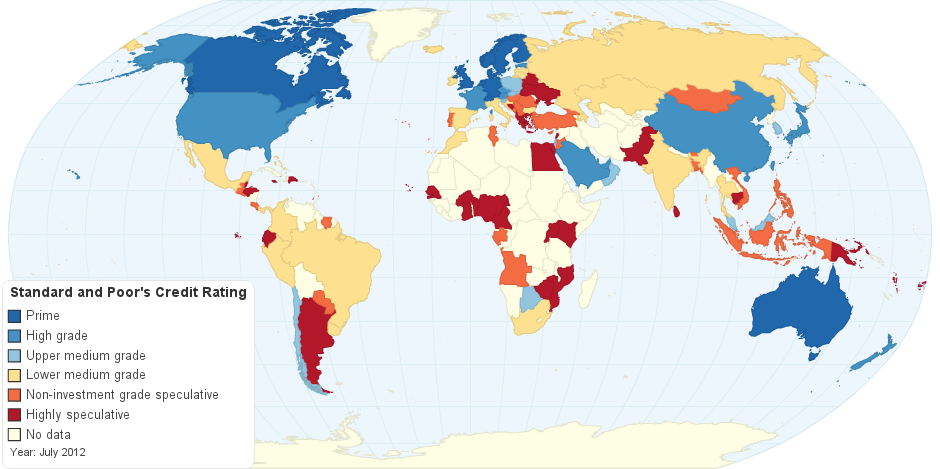 The ratings agency Standard & Poor’s (S&P) has reaffirmed its rating of Mozambique as “B-/B”, but warns of the possibility of a downgrade to “SD” (selective default).In July 2015 S&P downgraded Mozambique's long term rating from B to B-, largely due to the 850 million US dollar loan taken by the Mozambican Tuna Company (EMATUM) in 2013 on the Eurobond market, and guaranteed by the Mozambican government.Standard and Poor's, one of the world's three major ratings agencies, was alarmed by the statement in June 2015 in the Mozambican parliament, the Assembly of the Republic, by the Minister of Economy and Finance, Adriano Maleiane, that the government was seeking to restructure the EMATUM loan.As a guardian of financial orthodoxy, S&P regarded Maleiane’s words as heretical. “We view the guarantee as the government's financial obligation under our criteria, and we expect that we would classify the restructuring as a distressed debt exchange”, menaced the S&P release of the time.A “distressed debt” is defined as the debt of companies that have filed for bankruptcy or have a significant chance of filing for bankruptcy in the near future.The government has not yet succeeded in restructuring the EMATUM loan, and paid the interest owing (of about 105 million dollars) in September last year. The next payment falls due in March.So S&P, in a release issued on Friday, kept Mozambique’s long term sovereign rating unchanged at B-, and the short term rating at B.
The ratings agency Standard & Poor’s (S&P) has reaffirmed its rating of Mozambique as “B-/B”, but warns of the possibility of a downgrade to “SD” (selective default).In July 2015 S&P downgraded Mozambique's long term rating from B to B-, largely due to the 850 million US dollar loan taken by the Mozambican Tuna Company (EMATUM) in 2013 on the Eurobond market, and guaranteed by the Mozambican government.Standard and Poor's, one of the world's three major ratings agencies, was alarmed by the statement in June 2015 in the Mozambican parliament, the Assembly of the Republic, by the Minister of Economy and Finance, Adriano Maleiane, that the government was seeking to restructure the EMATUM loan.As a guardian of financial orthodoxy, S&P regarded Maleiane’s words as heretical. “We view the guarantee as the government's financial obligation under our criteria, and we expect that we would classify the restructuring as a distressed debt exchange”, menaced the S&P release of the time.A “distressed debt” is defined as the debt of companies that have filed for bankruptcy or have a significant chance of filing for bankruptcy in the near future.The government has not yet succeeded in restructuring the EMATUM loan, and paid the interest owing (of about 105 million dollars) in September last year. The next payment falls due in March.So S&P, in a release issued on Friday, kept Mozambique’s long term sovereign rating unchanged at B-, and the short term rating at B.
But the release warned that the outlook remains negative, and “Mozambique's external position is weak regarding both stocks and flows”, while the EMATUM loan “poses risks” to the country’s rating. If the EMATUM debt is restructured, that would raise the possibility of a ratings downgrade to “SD”.“Should the restructuring include an exchange that we would view as distressed (due for example to a reduction in principal or an extension of maturity dates), we could view the transaction as tantamount to default”, the release said. An extended maturity date is precisely one of the options that Maleiane mentioned last June.S&P noted that, in the second half of 2015, “Mozambique experienced deteriorating terms of trade, weaker external demand (especially from China), and a strengthening dollar”, all of which “have slowed investments in the country's mega-projects, which are mostly foreign financed”.Over the year, the Mozambican currency, the metical, depreciated by around 40 per cent, and the depreciation “stoked inflation, which rose beyond 10 per cent and reduced GDP per capita to 500 dollars this year from more than 600 dollars two years ago”.Nonetheless S&P anticipates that the Mozambican economy “will still expand by at least 7% annually over 2017-2019, assuming that several major hydrocarbon investments go ahead, including the construction of liquefied natural gas (LNG) trains”.The agency believed that the Mozambican government will conclude its negotiations over LNG with the main investors (the US company Anadarko, and ENI of Italy) this year, leading to the start of construction of the LNG plants in 2017.Furthermore, the release adds, “most of the rail track to new coal deposits has been laid, which should support higher coal production over 2016-2019 provided international prices recover from the current low levels”.S&P warns that although these natural resource projects, “once completed, will improve Mozambique's export mix and boost its economy, they entail short-term risks. These projects are the main reason for the country's large current account deficits, which have exceeded 30% of GDP over the past four years and were mainly financed with foreign direct investment”.The agency believed that the ratio of net external liabilities to current account receipts will rise to 876 per cent in 2019 from an already high 632% in 2015. Although most of these liabilities will be to foreign direct investors, we expect public-sector external debt to increase by about one half over that period in nominal terms”.On the positive side, S&P expected inflation to fall to single digits in 2016, and praised the banking system as “broadly well capitalized and stable”.
It also downplayed the risks of political instability and believed that any disruption caused by the former rebel movement Renamo will be “unlikely to derail the overall functioning of government institutions”.
0 comentários:
Post a Comment